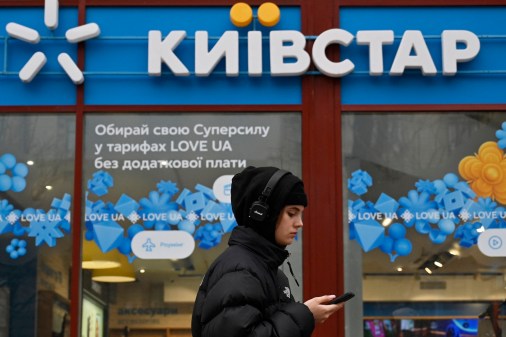Russia’s invasion of Ukraine has turned the global internet into a battlefield

Russia and Ukraine are both racing to take control of a key battlefield in the ongoing conflict: the internet.
Moves by both countries have open internet advocates worrying that civilians’ rights to the global internet and freedom of information are getting caught in the middle.
Ukraine failed in one of its attempts to cut Russia off on Wednesday. The Internet Corporation for Assigned Names and Numbers (ICANN) — a nonprofit that oversees domain and internet protocol systems vital to the global internet — rejected a request by Ukrainian officials to shut down high-level Russian domains.
ICANN noted that it is not able to take unilateral action to disconnect domains. Third-party operators have control over security certificates and root server systems, two other services that Ukraine asked ICANN to revoke or shut down.
“The Internet is a decentralized system,” Göran Marby, president and chief executive officer of ICANN, wrote in the letter sent Wednesday in response to Ukraine’s request. “No one actor has the ability to control it or shut it down.
“In our role as the technical coordinator of unique identifiers for the Internet, we take actions to ensure that the workings of the Internet are not politicized, and we have no sanction-levying authority,” Marby wrote. “Essentially, ICANN has been built to ensure that the Internet works, not for its coordination role to be used to stop it from working.”
Regional internet registry RIPE NCC, which oversees the internet in parts of Europe, the Middle East and Asia, also denied a request by Ukraine, citing political neutrality.
“It is crucial that the RIPE NCC remains neutral and does not take positions with regard to domestic political disputes, international conflicts or war,” the body’s executive board wrote.
There are numerous examples in recent years of authoritarian regimes shutting down internet services and censoring information in times of conflict. But Ukraine’s campaign for internet companies and organizations to respond to Russian aggression by shutting down their services is an entirely new approach that raises its own human rights issues, said Natalia Krapiva, tech legal counsel at Access Now.
Pressure from both Russia and Ukraine has put tech companies and organizations — those who want to support Ukraine while also protecting user rights — in the middle. Tech giants including Google, Facebook and Twitter have taken steps to limit propaganda by restricting Russian state media, including banning it in Europe.
The Ukrainian government is urging them to go further by shutting down services in Russia. Some tech companies have already taken steps towards doing so. Business software company Oracle shut down operations in Russia and Apple suspended product sales in the country.
Tech companies are also under pressure from Russia, which has pushed for a reversal on state media bans. The country last year passed a series of laws that human rights experts say are designed to make platform employees and data more susceptible to Russian censorship. Fines for violating the laws have gone into effect this month, adding to the burdens tech companies operating in the country face.
Unintended consequences
Human rights defenders worry that pressure to cut off Russia from the global internet will prevent civilians from accessing independent sources of information and strengthen Russia’s grip over its population. Russia has already censored some domestic independent news sources for reporting on the invasion.
Leaving Russians with state propaganda as their only news source will lead to a “risk of unspeakable violence and crimes committed against Ukrainian people,” said Krapiva.
U.S. officials have also expressed concerns about the Russian censorship of outside information under the regime of President Vladimir Putin.
“The people of Russia did not choose this war. Putin did,” State Department spokesperson Ned Price said in a statement responding to Russia’s suppression of information. “They have a right to know about the death, suffering and destruction being inflicted by their government on the people of Ukraine. The people of Russia also have a right to know about the human costs of this senseless war to their own soldiers.”
But Krapiva says that the government could do more to express its support for American tech companies standing up for users even while under pressure by both Ukraine and Russia to restrict services.
“Indicating they have the company’s back on this is important because I think companies are like ‘oh, we’re left in the middle,” said Krapiva.
Open Internet advocates are also pressing the European Union to keep Ukrainians connected to the internet while the attacks continue. Access Now wrote a letter to European Union officials on Wednesday requesting that the body take steps to encourage telecom operators to boost connectivity and to ensure that platforms that provide key communications channels remain online in Ukraine, Russia and Belarus.
“We need to stand with people of Ukraine, but also civil society around the world, including the Russians and Belarusians who are fighting violence,” said Krapiva. “We need to help them organize online and offline and have their voices heard. The internet is enabling their right to do so.”

This story was featured in CyberScoop Special Report: War in Ukraine




